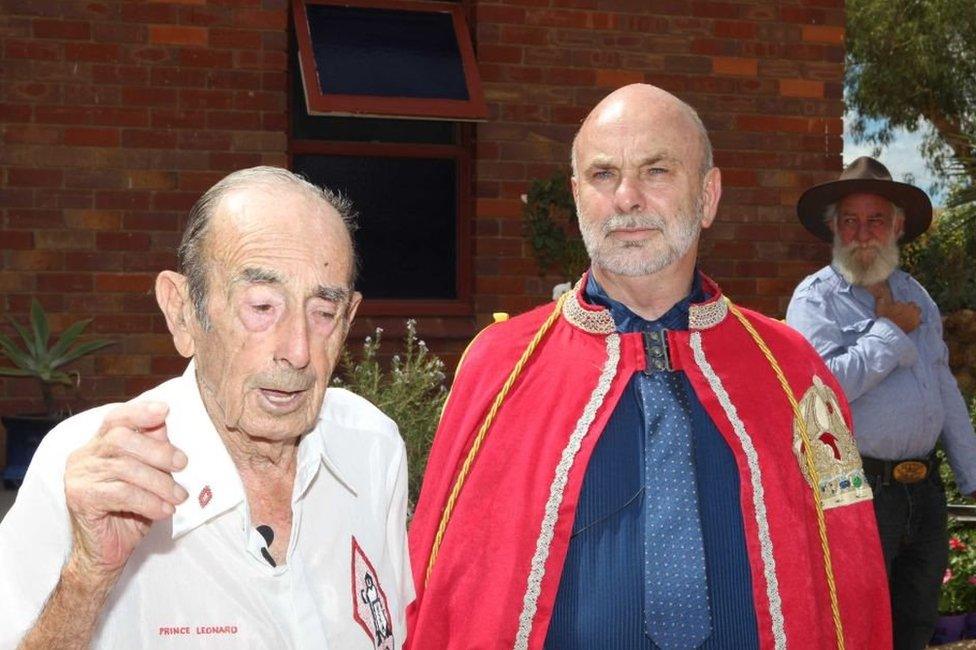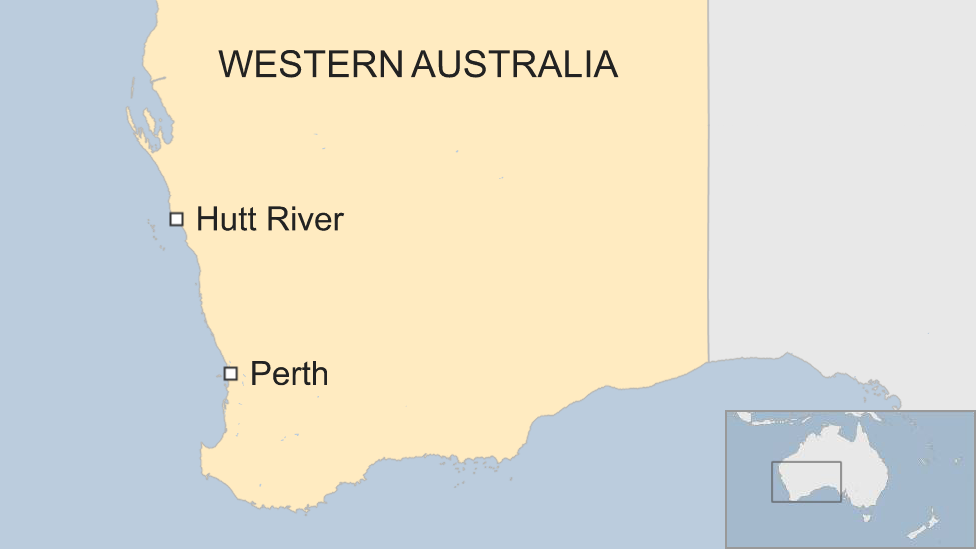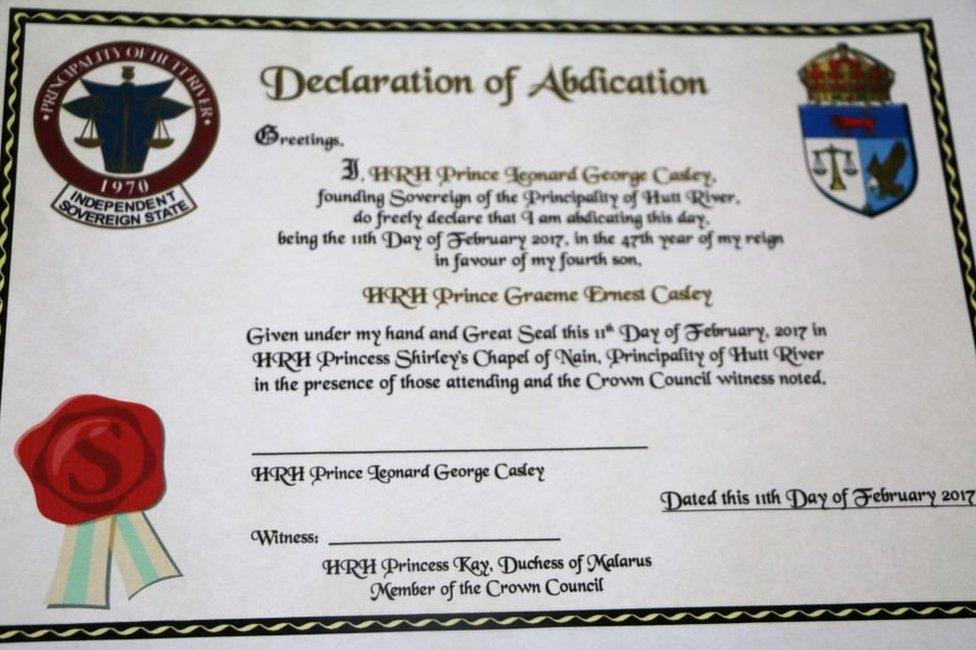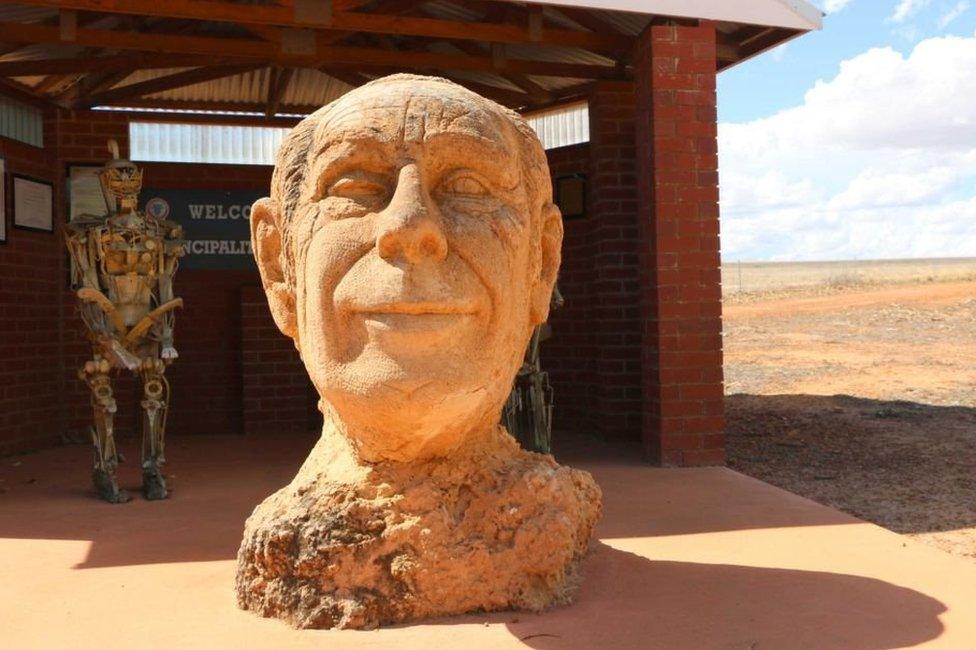Hutt River: The Australian farm with a 'royal' family
- Published

Prince Leonard, left, with his son and successor Prince Graeme
It has been an exciting week for Prince Graeme I, the newly crowned "monarch" of a micronation in Australia.
More than 45 years ago his father, Prince Leonard, claimed to have seceded the family farm amid a dispute with the government over wheat quotas.
He declared his 18,500-acre property, 500km (300 miles) north of Perth, its own country: the Principality of Hutt River.
It created its own tax system and laws, issued by a government of five ministers. It has its own currency, stamps and passports - 8,000 are held by "dual nationals" - and a population of about 30 people.

For decades it has attracted curious tourists, who pay A$4 (US$3; £2.50) for a visa and receive a personal tour.
But at 91 and battling emphysema, Prince Leonard handed the crown to his youngest son, a former schoolteacher, earlier this month.
"There's some very big shoes to fill," Prince Graeme, whose real name is Graeme Casley, told the BBC.
What is the deal with tax?
The privately owned property is bigger than the Vatican, Monaco and Nauru. But like other micronations, Hutt River is not recognised by the world's governments.
The princes claim to have had diplomatic dealings with Kenya, the Ivory Coast, Croatia and Benin, while relations with Canberra remain "dynamic". This is not surprising considering Hutt River briefly declared war on Australia in 1977 after tax authorities demanded payments.
Earlier this year, the Australian Tax Office sent a writ , externalordering Prince Leonard to pay A$2.6m (£1.6m; $2m) in back taxes. Prince Graeme claims Australian authorities "guesstimated" how much the principality had earned from tourism.
Although they have vowed to contest the sum in court, Prince Leonard has previously admitted giving "gifts" - what others might call taxes - to authorities.

"We feel they want to take the jurisdiction and take us back under Australian law," Prince Graeme says. Like interviews given by his father, it is not immediately clear if Prince Graeme is speaking tongue-in-cheek.
The tax fuss did not stop them inviting Prime Minister Malcolm Turnbull to the abdication ceremony. Mr Turnbull politely declined, citing "existing parliamentary commitments".
How many micronations are there?
Dr Judy Lattas, a sociologist who has studied this area, once counted 33 active micronations in Australia. Some were as small as an apartment, while others claimed territory larger than some recognised countries.
John Ryan, co-author of Lonely Planet's guide to self-proclaimed nations, argues there are three main types. The first is a serious attempt at statehood, usually set off by a sense of being wronged or marginalised. The second is concerned with exploring sovereignty as a concept, often in a comedic way. The third is simply about wanting to be in power.
Australian micronations include:
The Gay and Lesbian Kingdom of the Coral Sea Islands, external, set up by Emperor Dale I in 2004 as a reaction to the Australian government's refusal to acknowledge same-sex marriage.
The Murrawarri Republic,, external an Aboriginal micronation which declared in 2013 that it never ceded sovereignty to Australia. It claims approximately 82,000 sq km straddling New South Wales and Queensland.
The Principality of Wy, external, in the wealthy Sydney suburb of Mosman, which was formed after a dispute over a driveway.
Micronations frequently cite the Montevideo Convention on the Rights and Duties of States, which was signed in 1933 at the International Conference of American States. It defines four requirements for nationhood: a permanent population, a defined territory, a government, and the "capacity to enter into relations with the other states".
"It's about people taking charge," Mr Ryan says. "They're almost all men. In fact, we didn't find any women who were leading micronations."

A huge bust depicting Prince Leonard, the former ruler of Hutt River
The Empire of Atlantium, external is a micronation occupying just 0.76 sq km (0.29 sq miles) on a property southwest of Sydney. The entire country can be rented on AirBnB.
But its founder, George II, told the BBC he is concerned with things other than money. He supports euthanasia, marriage equality, abortion rights and international freedom of movement.
He laments that other micronations have often attracted people who were anti-government and anti-tax.
"It tends to be more of a right-wing movement," he says. "They're people that are eccentric and who think they have found a unique interpretation of the law."
Mr Ryan says micronations capture our imagination because they appeal to our inner child, and because they're humorous.
"I don't know if Prince Leonard or his family are in on the joke but I think most people think it's pretty funny," Mr Ryan says.
"I think it is amusing but I also think it's daring, brave and bold."